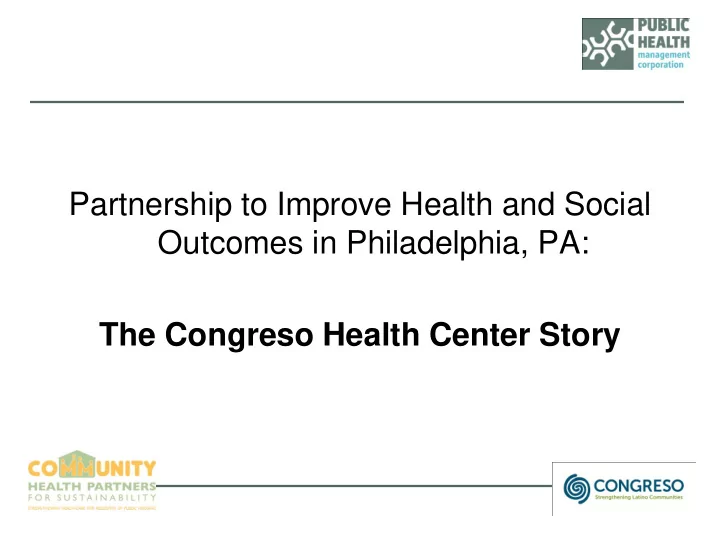

Partnership to Improve Health and Social Outcomes in Philadelphia, PA: The Congreso Health Center Story
Introductions Alex Lehr O’Connell Director Community Health Partners for Sustainability Waleska Maldonado Senior Vice President of Health Congreso de Latinos Unidos Jennifer Atlas Manager of Quality Assurance and Partnerships Congreso de Latinos Unidos Melissa Fox Managing Director of Health Public Health Management Corporation
Objectives for Today Participants will: – Learn about a new public housing health center serving a predominantly Latino, urban community; – Understand the benefit of FQHC partnership with a social services organization to improve service coordination and outcomes; – Identify challenges to partnership and strategies to overcome them. 3
Why Partner? Without partnership With partnership Strengths of Organization 1 Organization 2 Organization 1 Larger objective Strengths of Strengths of Nebulous Organization Organization 2 3 idea of social change Social change Organization 3 4
Benefits of Partnership • Services complement each other – reduces care gaps on both sides • Strengthens continuum of care for underserved residents • FQHC rate supports both organization’s services
Recent Trends in Public Housing 1. Greater demand 2. New approaches in housing • Decentralization • Expanded eligibility 3. New approaches in health care 6
Recent Trend: New Approaches in Housing • Increase in total units is from increases in Voucher program • Public Housing units actually decreased slightly 2500000 2000000 Number of Units 1500000 Public Housing Voucher Program 1000000 500000 0 1996 2008 Year 7
Recent Trend: New Approaches in Housing • Increased reliance on Section 8 (e.g., voucher) programs – Section 8-only programs are defined as assisted housing, NOT public housing, and are NOT covered under Section 330i funding for FQHCs (unless receiving other, non-Section 8 funds under U.S. Public Housing Act of 1937). • Increased reliance on scattered sites – When receiving non-Section 8 Public Housing Act funds, ARE defined as public housing and ARE covered under Section 330i. 8
PHMC - Background • Public Health Institute with 20 years experience in Philadelphia region • Five federally-qualified health center sites • Health Care for the Homeless and Public Housing Primary Care grantee • Strong clinical model supported by a network of internal ancillary care programs
PHMC – Interest in Partnership • Demographic shifts in community; growing Latino population • Respect for Congreso as service provider within community • Expansion of care footprint • Trust between leadership
Congreso – Background • Mission: To strengthen Latino communities through social, economic, education, and health services; leadership development; and advocacy. • Located in Eastern North Philadelphia • Serve 15,000 community residents annually through 50 programs in health, social services, and education
Congreso – Background • Service area statistics: – Over 80% of community at 200% of FPL or below – Over 116,000 in service area that need care – Medically underserved area • Client stories – 34% of clients access care in the ER – Over 60% of clients have a chronic condition (asthma, heart disease, diabetes) • 40% of clients go to ER annually with this condition
Congreso – Interest in Partnership • Health care = the missing piece across all services provided • Demonstrated lack of access to primary care • Respect for PHMC as service provider • Trust between leadership
Community Health Partners for Sustainability – Background • HRSA-funded National Cooperative Agreement • Provides training and technical assistance to Public Housing Primary Care grantees and other groups • History of assessing need and building capacity through partnerships to meet that need
Community Health Partners for Sustainability – Involvement History
Challenges to Partnership • PHMC perspective: – Staff turnover – Adapting standard model to new partnership approach • Congreso perspective: – Staff turnover – Understanding and integrating organizational systems for HR, QA, and finances
Success of the partnership • PHMC perspective: – Cross-service outcome measurement – New community served • Congreso perspective: – Better able to serve our clients holistically – Missing piece fulfilled
Recommendation for Developing Partnerships • Start early • Find common ground • Transparency • Ongoing and consistent communication
PHMC/Congreso – Vision for the Future • Service integration that wraps around the whole individual/family needs • Outcomes evaluation that combines social and health factors • Integrate additional services across multiple sites • Disseminate partnership model and results
Discussion • What are the unmet needs of public housing residents in your community? • What barriers to partnership have you encountered and how have you attempted to address them? • What organizations or programs in your community could you partner with to expand your services?
Questions?
Thank You! Alex Lehr O’Connell Jennifer Atlas Director of Technical Assistance and Manager of Quality Assurance and Consultation Partnerships Community Health Partners for Congreso de Latinos Unidos Sustainability Phone: (215) 763-8870 Ext. 1427 Phone: 215-731-7141 Fax: (215) 291-1394 Fax: 215-731-2400 atlasj@congreso.net alex@chpfs.org Waleska Maldonado Melissa Fox Senior Vice President of Health Managing Director of Health Congreso de Latinos Unidos Public Health Management Phone: (215) 763-8870 Ext. 1306 Corporation Fax: (215) 291-1394 Phone: 215-985-6886 waleskam@congreso.net Fax: 267-648-3064 mfox@phmc.org
Recommend
More recommend